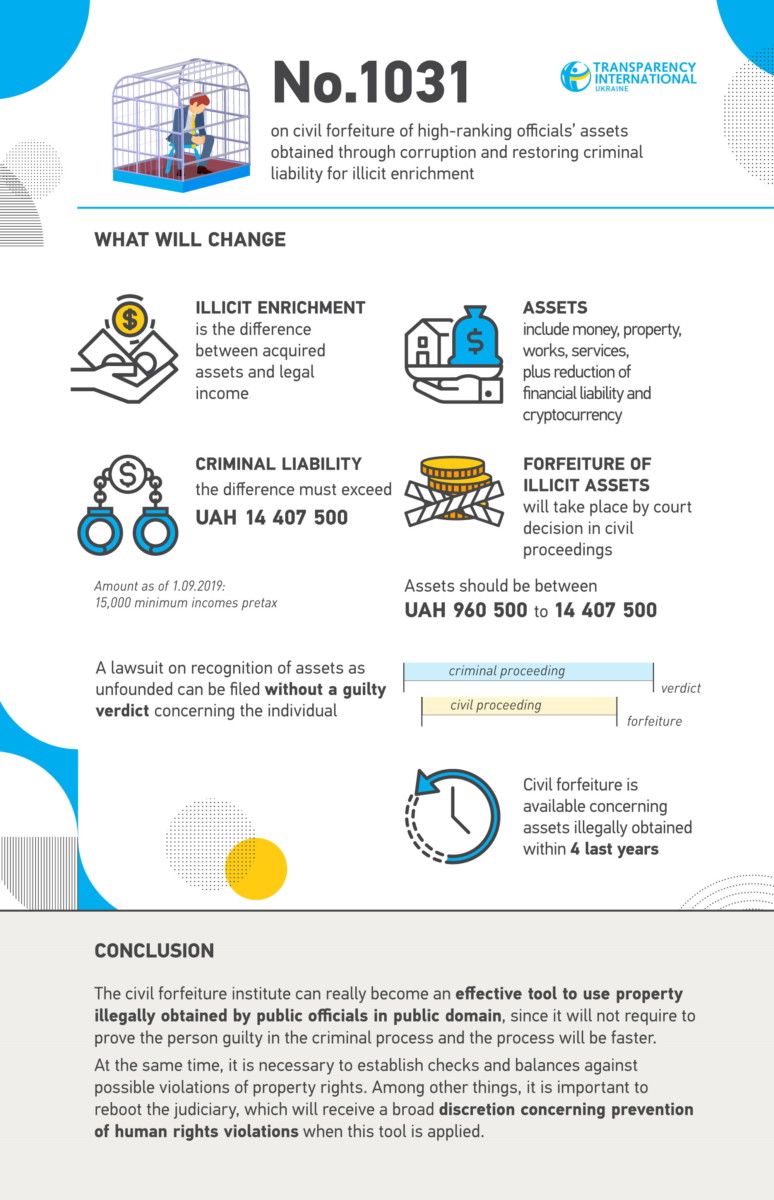

On 29 August 2019, the President of Ukraine submitted urgent draft law No. 1031 on civil forfeiture of high-ranking officials’ assets obtained through corruption and restoring criminal liability for illicit enrichment.
UPDATE of October 1, 2019
Before the second reading, the anti-corruption committee did reduce the threshold for criminal liability for illicit enrichment.
If the draft law is adopted in the current version, an official with unexplained wealth for the amount of over UAH 6,243,250 (6,500 minimum pretax wages) will be brought to criminal liability as opposed to just civil forfeiture.
Analysis of the presidential draft law
What will change?
- Illicit enrichment is defined as the difference between acquired assets and legal income.
- For an act to be criminalized, the difference must constitute more than fifteen thousand tax-free minimum incomes of an individual (as of 1 January 2019 – UAH 14,407,500, i.e. approximately EUR 480,000). This amount reduces the potential number of cases on illicit enrichment, but it helps law enforcement agencies to focus on the most significant violations.
- Assets include not only money, property, works or services, but also, for instance, reduction of financial liability and cryptocurrency.
- A lawsuit on recognition of assets as unfounded can be filed without a guilty verdict concerning the individual. Forfeiture of public officials’ illegally obtained assets will take place by court decision in civil proceedings.
- The High Anti-Corruption Court will review civil lawsuits on recognition of assets as unfounded. The claimants are representatives of the National Anti-Corruption Bureau of Ukraine or prosecutors of the Prosecutor General’s Office of Ukraine.
- The option of civil forfeiture is provided concerning assets illegally obtained within four years before the Law comes into effect. As of 1 January 2019, the assets in question should be over UAH 960,500, or approximately EUR 31,000. This partially resolves the problem of cases closed after the illicit enrichment provision was repealed.
Our recommendations
It is advisable to restrict the period of asset acquisition and define more clearly what is meant under legal income.
Where we are now
On 26 February, the Constitutional Court of Ukraine recognized the Article of the Criminal Code of Ukraine (hereinafter – the Code) criminalizing illicit enrichment of public officials unconstitutional. The Constitutional Court of Ukraine believes that the current version of Article 3682 of the Code violates Arts. 8, 62 and 63 of the Constitution of Ukraine. TI Ukraine has explained why this judgement was not factually correct. In spite of this, the decision of the Constitutional Court of Ukraine is binding, final and cannot be appealed, and Article 3682 of the Code has become invalid since the day when the Constitutional Court of Ukraine made this Decision.
On 29 August 2019, the President of Ukraine submitted draft law No. 1031 on civil forfeiture of high-ranking officials’ assets obtained through corruption and restoring criminal liability for illicit enrichment.
Key aspects
TI Ukraine has emphasized that it was necessary to extend the civil forfeiture institute and restore criminal liability for illicit enrichment:
- With consideration of the concerns expressed by the Constitutional Court of Ukraine;
- In a way that would minimize the risk of the article being repealed;
- In a way that would make it possible for law enforcement to establish all elements of a crime.
- Criminal liability for illicit enrichment
The proposed text introduces the following approaches to regulating criminal liability for illicit enrichment:
- The interpretation of illicit enrichment as the difference of value between acquired assets and income is introduced, which is consistent with the approach proposed by TI;
- For an act to be criminalized, the difference must constitute more than fifteen thousand tax-free minimum incomes of an individual (as of 1 January 2019 – UAH 14,407,500, i.e. approximately EUR 480,000). This amount is fifteen times greater than the minimum proposed by TI and the old version of the illicit enrichment article, and corresponds to what was suggested by TI as an act “on a large scale.” On the one hand, this version reduces the potential number of cases on illicit enrichment, on the other hand, it helps law enforcement agencies to focus on the most significant violations. For assets that exceed five hundred tax-free minimum wages (as of 1 January 2019 – UAH 960,500, or approximately EUR 31,000), it is proposed to apply civil forfeiture.
Definitions of assets and income are removed from the description in the article itself and are added as notes. Assets are defined as not only money, property, works, but also, for instance, as the amount of reduction of financial liability, which has also been suggested by TI Ukraine and makes for an as broad definition of the notion as possible. It is also important that the article defines legal income as income rightfully obtained by the individual from legal sources, namely those specified in Article 46, part 1, clause 7 of the Law of Ukraine “On Corruption Prevention,” that is, legally acquired assets.
It is also advisable to restrict the period of asset acquisition and define more clearly what is meant under legal income.
- Civil forfeiture
Civil forfeiture is a potential tool to collect the property illegally obtained by public officials in recent years for the benefit of the budget. It should be regarded as a way to forfeit property of an individual to public domain when such property has not been subject to seizure or special seizure and when legal grounds of its acquisition have not been proven. Finding and identification of illegally obtained assets will take place as part of the pre-trial criminal investigation, during which funds and other illegal assets will be traced, recorded and seized. Afterwards, a civil lawsuit will be filed to recognize such assets as unfounded.
The following approaches to extending the civil forfeiture institute are implemented:
-
- A lawsuit on recognition of assets as unfounded can be filed without a guilty verdict concerning the individual. Forfeiture of public officials’ illegally obtained assets will take place by court decision in civil proceedings.
- The jurisdiction of the High Anti–Corruption Court extends to review of civil lawsuits on recognition of assets as unfounded. The claimants are representatives of the National Anti-Corruption Bureau of Ukraine or prosecutors of the Prosecutor General’s Office of Ukraine.
- The burden of proof of the connection between the assets and the public official and the fact that such assets are unfounded lies on the NABU or the PGO. At the same time, if such evidence is provided, the burden of proof of the fact that the assets are legal lies on the defendant.
- The option of civil forfeiture is provided concerning assets obtained within four years before the Law comes into effect, if the value of such assets exceeds 500 minimum incomes (as of 1 January 2019 – UAH 960,500, or approximately EUR 31,000). This partially resolves the problem of cases closed after the illicit enrichment provision was repealed. Now, illegally obtained assets can be seized in civil proceedings.
- Civil forfeiture of assets acquired after the Law comes into effect will be used for assets of the following amounts: between five hundred minimum wages to fifteen hundred tax-free minimum incomes (as of 1 January 2019 – UAH 960,500 to UAH 14,407,500, or approximately EUR 31,000 to EUR 480,000). Everything that exceeds this amount means criminal liability for illicit enrichment.
- Seizure of assets within three days of addressing the court. Assets are transferred to the ARMA following agreement of the owner or a court decision.
- It should be noted that the European Court of Human Rights recognizes that seizure of assets beyond the scope of a criminal proceeding does not contradict the presumption of innocence, does not violate property rights and does not constitute punishment without trial (see cases M v Italy, Arcuri and Others v Italy, Riela and Others v Italy, Butler v the UK, Welch v the UK, Gogotidze and Others v Georgia).
Asset forfeiture beyond the scope of criminal proceedings is used in such countries as Australia, Israel, Ireland, Canada, Liechtenstein, Lithuania, South African Republic, Slovenia, the UK, Thailand, Fiji, Philippines, Switzerland. Civil forfeiture is permitted under Directive 2014/42/EU of the European Parliament and of the Council.
Conclusion
The civil forfeiture institute can really become an effective tool to use property illegally obtained by public officials in public domain, since it will not require to prove the person guilty in the criminal process and the process will be faster. It will also allow to resolve the problem of 65 criminal cases closed after the illicit enrichment provision was recognized unconstitutional. Assets illegally obtained during the past four years in these cases may also add to the national budget.
At the same time, it is necessary to establish checks and balances against possible violations of property rights. Among other things, it is important to reboot the judiciary, which will receive a broad discretion concerning prevention of human rights violations when this tool is applied. Peaceful property ownership and compliance with proper legal procedure should be ensured.
The civil forfeiture institute can really become an effective tool to use property illegally obtained by public officials in public domain, since it will not require to prove the person guilty in the criminal process and the process will be faster.







